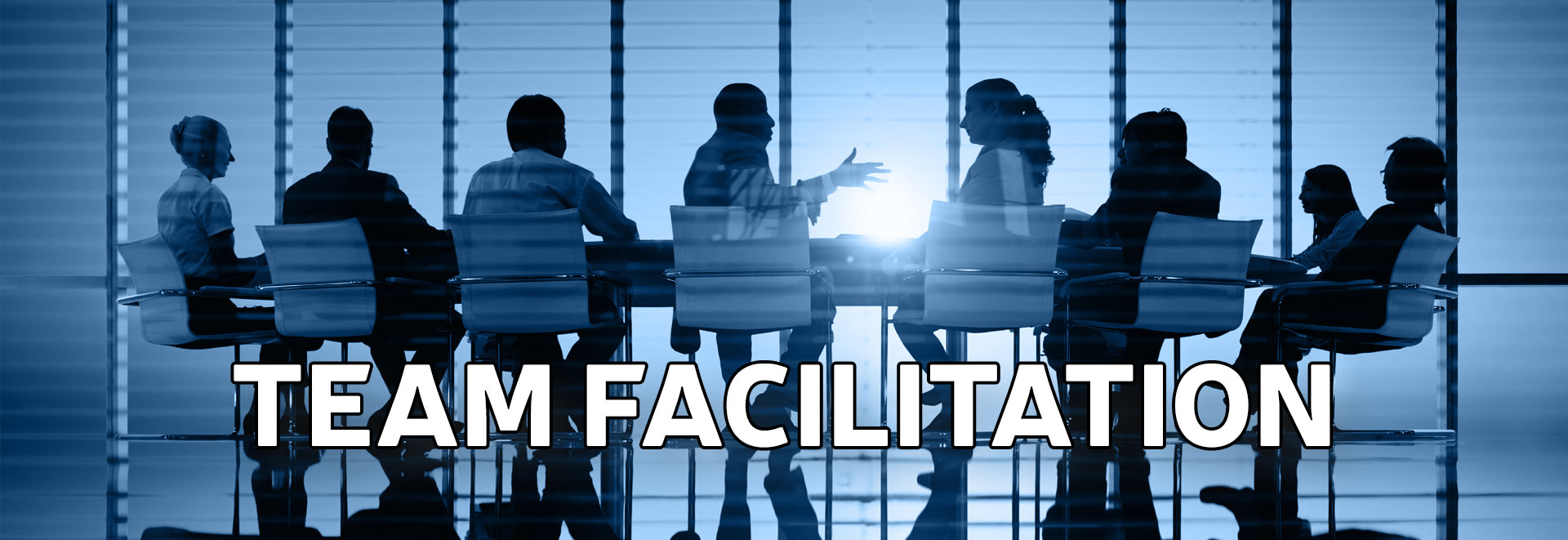
Team Facilitation
LEARNING FRAMEWORK AGENDA
In my work with executive leadership teams, I facilitate structured dialogue processes that allows for greater perspective taking. This involves developing an increased awareness of assumptions that are being made, and the implicit stories that are being told below the conscious thought level. We explore limiting beliefs, the ways that team members may be caught in various forms of “win/lose” drama patterns.
Identifying these confounding and limiting behaviors then sets the stage for learning how to have more skillful discussions and deepening dialogue. The team is then able to trust into next level alignment of collaborative partnerships, the exercising of vulnerable power, and the realization of mutually transforming relationships.
TEAM LEARNING
Like a sports team striving to do their best, many management teams simply aspire to play the equivalent of one great game. They’d be excited if they could improve delivery time to customers by 20 percent. We know a few teams who are trying to pull off, in effect, a great season— a string of successful results. But the real potential of this discipline is to help teams re-create themselves so that gains in capability don’t just last for one season, but are sustained and self-reinforcing.
Because of the long-standing experience which many organizations have with group dynamics and team building, many teams believe that they have been practicing a version of this discipline for years. However, unlike team building, team learning is not a discipline of improving team members’ skills, not even communication skills. For many years, we have used the concept of alignment as distinct from agreement, to capture the essence of team learning.
Alignment means “functioning as a whole.” Building alignment (you never “get there”) is about enhancing a team’s capacity to think and act in new synergistic ways, with full coordination and a sense of unity, because team members know each other’s hearts and minds. As alignment develops, people don’t have to overlook or hide their disagreements; indeed, they develop the capacity to use their disagreements to make their collective understanding richer.


TEAM LEARNING
Like a sports team striving to do their best, many management teams simply aspire to play the equivalent of one great game. They’d be excited if they could improve delivery time to customers by 20 percent. We know a few teams who are trying to pull off, in effect, a great season— a string of successful results. But the real potential of this discipline is to help teams re-create themselves so that gains in capability don’t just last for one season, but are sustained and self-reinforcing.
Because of the long-standing experience which many organizations have with group dynamics and team building, many teams believe that they have been practicing a version of this discipline for years. However, unlike team building, team learning is not a discipline of improving team members’ skills, not even communication skills. For many years, we have used the concept of alignment as distinct from agreement, to capture the essence of team learning.
Alignment means “functioning as a whole.” Building alignment (you never “get there”) is about enhancing a team’s capacity to think and act in new synergistic ways, with full coordination and a sense of unity, because team members know each other’s hearts and minds. As alignment develops, people don’t have to overlook or hide their disagreements; indeed, they develop the capacity to use their disagreements to make their collective understanding richer.

Anyone doing serious work in team learning should be familiar with the key reflection-and-inquiry skills of balancing advocacy with inquiry, seeking to bring tacit assumptions to the surface, and becoming aware of the assumptions and beliefs that link “what we see” to “what we conclude.”
Team learning transforms those skills into capabilities; they become collective vehicles for building shared understanding.
Improved conversation is the primary medium with which management teams build all of these capabilities. Specifically, the most effective practice we know for team learning emerges from two conversational forms: dialogue and skillful discussion.
Teams need to establish their own “road rules” for conversation. These may include agreements to speak the truth as each person understands it, bring relevant information immediately to the team, or limit the time each person can speak. Teams may decide to clarify how decisions will be made and by whom, and to establish ways to safely check and challenge each other. Once the rules are set by general consensus, it’s important for the team to discuss how it will deal with violations. These rules are meant to help the team shape its conversations, not as an end in themselves; and they should never become so dominant that they override the team’s purposes and learning.

Anyone doing serious work in team learning should be familiar with the key reflection-and-inquiry skills of balancing advocacy with inquiry, seeking to bring tacit assumptions to the surface, and becoming aware of the assumptions and beliefs that link “what we see” to “what we conclude.”
Team learning transforms those skills into capabilities; they become collective vehicles for building shared understanding.
Improved conversation is the primary medium with which management teams build all of these capabilities. Specifically, the most effective practice we know for team learning emerges from two conversational forms: dialogue and skillful discussion.
Teams need to establish their own “road rules” for conversation. These may include agreements to speak the truth as each person understands it, bring relevant information immediately to the team, or limit the time each person can speak. Teams may decide to clarify how decisions will be made and by whom, and to establish ways to safely check and challenge each other. Once the rules are set by general consensus, it’s important for the team to discuss how it will deal with violations. These rules are meant to help the team shape its conversations, not as an end in themselves; and they should never become so dominant that they override the team’s purposes and learning.
When results don’t turn out as expected, you and the other team members will need to master the art of forgiveness. Looking for someone to blame may mean abandoning the team’s learning. Forgiveness means standing with the persons who were leading the experiment at hand, and helping the team discern what forces at play contributed to the unexpected outcomes. Forgiveness also means not holding the mistake as a trump card to be used some time in the future when politics would encourage it. Exercising forgiveness is different than an unwillingness to hold people accountable, as laid out in “The Five Dysfunctions of Teams” model.
Dialogue’s purpose, as we now understand it, would be to create a setting where conscious collective mindfulness can be established and maintained. The theory of dialogue suggests that breakdowns in the effectiveness of teams and organizations are reflective of a broader crisis in the nature of how human beings perceive the world differently. As a natural mechanism to develop meaning, people learn to divide the world into categories and distinctions in our thoughts. We then tend to become almost hypnotized by these distinctions, forgetting that we created them in the first place. Team learning means making these assumptions explicit, and then using conversation skills to cohere and move the team strategically forward.


When results don’t turn out as expected, you and the other team members will need to master the art of forgiveness. Looking for someone to blame may mean abandoning the team’s learning. Forgiveness means standing with the persons who were leading the experiment at hand, and helping the team discern what forces at play contributed to the unexpected outcomes. Forgiveness also means not holding the mistake as a trump card to be used some time in the future when politics would encourage it. Exercising forgiveness is different than an unwillingness to hold people accountable, as laid out in “The Five Dysfunctions of Teams” model.
Dialogue’s purpose, as we now understand it, would be to create a setting where conscious collective mindfulness can be established and maintained. The theory of dialogue suggests that breakdowns in the effectiveness of teams and organizations are reflective of a broader crisis in the nature of how human beings perceive the world differently. As a natural mechanism to develop meaning, people learn to divide the world into categories and distinctions in our thoughts. We then tend to become almost hypnotized by these distinctions, forgetting that we created them in the first place. Team learning means making these assumptions explicit, and then using conversation skills to cohere and move the team strategically forward.
Team Building Without Time Wasting Ladder of Inference, and Telling Ourselves Stories
I model communication skills by asking if I might play the role of the leader who may be experiencing challenge in framing and expressing what is on their mind, and in stating what really matters, or what is frustrating or depressing.
Much of my facilitation involves not only inviting leaders into speaking their truths, but also, often modeling how they might more resourcefully communication their intentions in assertive ways that serve to create connections rather than animosity. Here we work and play with polarities such as “firmness and flexibility”, “conditional and unconditional respect”, “candor and diplomacy”, “harmony and debate”, “good of the department and good of the organization” etc.
We learn what habits are getting in the way of dialogue, and how to reconceive bad into better habits that create alignment. Drawing from models such as Lencioni’s “The Five Dysfunctions of Teams” affords groups clear roadmaps to progress toward their alliance goals.
Learning also involves explorations into the stories we tell ourselves as a means of justifying our positions, and rationalizing why we would rather be “right” than be happy. Mental models such as “the ladder of inference”, the “left hand column”, balancing “advocacy and inquiry”, the “Four Parts of Speech” and many others afford leaders powerful tools with which to re-author their stories and their strivings.
 My husband and I have been working with Bert for six months now. When we came to see him initially, we were really close to giving up. We had seen other counselors and coaches both as a couple and separately, but it hadn’t make any substantial lasting changes in our relationship. After a few sessions with Bert, I knew that this was the right person for us to work with; he had earned our trust, and I knew he would offer us the right mixture of challenge and encouragement. What ultimately shifted our relationship — our way of being with each other — was the experience of being with Bert; he constantly inspires and challenges us to live as our best selves, modeling how we might grow into something new, while helping to illuminate the inner dialogue or the behavior that could keep us stuck where we are. In his work with the Integral Institute and Spiral Dynamics, Bert has helped to map out the way that adults develop throughout their lives, and so it’s reassuring to hear him say we’re making progress, because he knows what progress really is: not just a horizontal translation into better skills and techniques, but also vertical growth into different ways of experiencing, being, and knowing. When we started, we were drowning in a sea of issues and disagreements; it’s clear now that we are on a learning journey together, and I feel so honored to have Bert on the journey with us,
My husband and I have been working with Bert for six months now. When we came to see him initially, we were really close to giving up. We had seen other counselors and coaches both as a couple and separately, but it hadn’t make any substantial lasting changes in our relationship. After a few sessions with Bert, I knew that this was the right person for us to work with; he had earned our trust, and I knew he would offer us the right mixture of challenge and encouragement. What ultimately shifted our relationship — our way of being with each other — was the experience of being with Bert; he constantly inspires and challenges us to live as our best selves, modeling how we might grow into something new, while helping to illuminate the inner dialogue or the behavior that could keep us stuck where we are. In his work with the Integral Institute and Spiral Dynamics, Bert has helped to map out the way that adults develop throughout their lives, and so it’s reassuring to hear him say we’re making progress, because he knows what progress really is: not just a horizontal translation into better skills and techniques, but also vertical growth into different ways of experiencing, being, and knowing. When we started, we were drowning in a sea of issues and disagreements; it’s clear now that we are on a learning journey together, and I feel so honored to have Bert on the journey with us,
acting as our coach, mentor, and teacher. 
Marcy Deluce, San Francisco, CA
 Bert Parlee is helping me during a critical point of my development as a leader. He is resourceful, kind, generous and perceptive not only of my stated needs and wishes, but also insightful of the ways I get in my own way. His wisdom, counsel and guidance have been absolutely invaluable.
Bert Parlee is helping me during a critical point of my development as a leader. He is resourceful, kind, generous and perceptive not only of my stated needs and wishes, but also insightful of the ways I get in my own way. His wisdom, counsel and guidance have been absolutely invaluable. 
Richard Karpel
 I first had the pleasure of experiencing Dr. Parlee’s talents when I enrolled for a weeklong training he led on Leadership in Westminster, Colorado. I was so impressed with his ability to weave world-class, cutting edge information with powerfully designed and skillfully implemented experiential learning that I approached him on the spot to take my organization through a year long Leadership Training Program.
I first had the pleasure of experiencing Dr. Parlee’s talents when I enrolled for a weeklong training he led on Leadership in Westminster, Colorado. I was so impressed with his ability to weave world-class, cutting edge information with powerfully designed and skillfully implemented experiential learning that I approached him on the spot to take my organization through a year long Leadership Training Program.
Bert is not only a world-class professional trainer, but he does so with a confidence that is complemented by highly attuned interpersonal sensitivity and empathic attunement. People are drawn to Bert as a person, enjoying his openness, authenticity and warmth.
I would be delighted to furnish any further information, either written or via telephone, that might assist you in your decision-making relative to Dr. Parlee. 
Rick Fort, President, ESM
 Bert Parlee is a wise and compassionate coach. His insightful questions have helped me unravel complicated tangles of thought, emotion, and behavior to reveal a path of growth congruent with my most authentic self. With kindness and steadfast encouragement, Bert has supported me through experiencing negative emotions and breaking identification with limiting belief systems. I trust Bert, and his coaching has profoundly impacted not only my life but also the lives of those closest to me.
Bert Parlee is a wise and compassionate coach. His insightful questions have helped me unravel complicated tangles of thought, emotion, and behavior to reveal a path of growth congruent with my most authentic self. With kindness and steadfast encouragement, Bert has supported me through experiencing negative emotions and breaking identification with limiting belief systems. I trust Bert, and his coaching has profoundly impacted not only my life but also the lives of those closest to me. 
Robin Reinach
 Bert Parlee is an amazing instructor that provided an abundance of content that can be applicable to any profession. As a participant, I was delighted to see our management team move from a group of working individuals to a leadership team that became focused on performance and innovation, while successfully managing change and understanding the human mindset. I suspect Bert’s being a psychologist has something to do with his ability to see hidden dynamics that we weren’t aware of. He helped open our eyes to see one another in refreshing new ways that were both profound and delightful.
Bert Parlee is an amazing instructor that provided an abundance of content that can be applicable to any profession. As a participant, I was delighted to see our management team move from a group of working individuals to a leadership team that became focused on performance and innovation, while successfully managing change and understanding the human mindset. I suspect Bert’s being a psychologist has something to do with his ability to see hidden dynamics that we weren’t aware of. He helped open our eyes to see one another in refreshing new ways that were both profound and delightful. 
Colleen Young, Director of Training Education Sales Management
 Bert is not only a world-class professional trainer, but he does so with a confidence that is complemented by highly attuned interpersonal sensitivity and empathic attunement. People are drawn to Bert as a person, enjoying his openness, authenticity and warmth. I would be delighted to furnish any further information, either written or via telephone, that might assist you in your decision-making relative to Dr. Parlee.
Bert is not only a world-class professional trainer, but he does so with a confidence that is complemented by highly attuned interpersonal sensitivity and empathic attunement. People are drawn to Bert as a person, enjoying his openness, authenticity and warmth. I would be delighted to furnish any further information, either written or via telephone, that might assist you in your decision-making relative to Dr. Parlee. 
Rick Fort, President, ESM
 As a large enterprise level organization moving towards increased global complexity, we needed larger, more empowering frameworks within which to manage our many complications and contradictions. Bert introduced us to Polarity Management and related Integral mental models, allowing us to have next level conversations with new stage concepts. Over the next few years with Bert serving as coach, facilitator, coach and consultant, our leadership team was much better prepared to negotiate the shift from a print to a digital foundation.
As a large enterprise level organization moving towards increased global complexity, we needed larger, more empowering frameworks within which to manage our many complications and contradictions. Bert introduced us to Polarity Management and related Integral mental models, allowing us to have next level conversations with new stage concepts. Over the next few years with Bert serving as coach, facilitator, coach and consultant, our leadership team was much better prepared to negotiate the shift from a print to a digital foundation. 
Vince O’Brien, President, ESM
 In 2008 I was fortunate enough to participate in one of Integral Institute’s Leadership Seminars that was facilitated by Bert Parlee and other world-class integrally informed thinkers. I was so inspired by Bert’s leadership skills and presentation style that I invited him to participate in a transformative initiative being implemented by the Government of British Columbia’s Ministry of Employment and Income Assistance. By means of executive coaching and staff training seminars, Bert pla…
In 2008 I was fortunate enough to participate in one of Integral Institute’s Leadership Seminars that was facilitated by Bert Parlee and other world-class integrally informed thinkers. I was so inspired by Bert’s leadership skills and presentation style that I invited him to participate in a transformative initiative being implemented by the Government of British Columbia’s Ministry of Employment and Income Assistance. By means of executive coaching and staff training seminars, Bert pla… 
Wayne Reid, Manager: Transformation and Implementation, Government of British Columbia, Provincial Services





 Get In Touch
Get In Touch 

